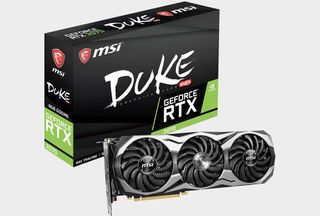Nvidia GeForce RTX 2070 price, deals, and where to buy
Here's all the new RTX 2070 graphics cards that are in stock and you can buy.

Nvidia's embargo on performance numbers for the GeForce RTX 2070 is now in the rear view mirror, and there are plenty of reviews to help you decide if this is the right graphics card for you. If you decide it is—which also means betting on real-time ray tracing and DLSS performance being acceptable with supported games arrive—then the next step is figuring out which specific SKU to buy, and where you can find the best deal. Well, we're here to help.
You could always head to Nvidia's website and buy a Founders Edition for $599. As with the other GeForce RTX cards, the Founders Edition is a better proposition this round. Gone is the blower-style cooler, replaced by a more custom-oriented solution, and the boost clock is overclocked to boot (1,710MHz, up from 1,620MHz).
That's far from the only option, though. Nvidia's hardware partners have come out of the gate with custom variants of their own, including models both big and small. Some of them revert to the old blower-style cooler that Nvidia dumped for this round, if that's what you prefer. The vast majority use burlier coolers, some with as many as three fans.
Most cards are only available for pre-order right now—there are a bunch on Newegg, for example—but we'll update this post as more become available:
Another route is to buy a pre-built gaming PC with a GeForce RTX 2070 inside. AVADirect, CyberPowerPC, Origin PC, and Xidax PC all have GeForce RTX 2070 options. Here's a handful that we found for sale from the major retailers as well:
Some online stores give us a small cut if you buy something through one of our links. Read our affiliate policy for more info.
The biggest gaming news, reviews and hardware deals
Keep up to date with the most important stories and the best deals, as picked by the PC Gamer team.
Jarred's love of computers dates back to the dark ages when his dad brought home a DOS 2.3 PC and he left his C-64 behind. He eventually built his first custom PC in 1990 with a 286 12MHz, only to discover it was already woefully outdated when Wing Commander was released a few months later. He holds a BS in Computer Science from Brigham Young University and has been working as a tech journalist since 2004, writing for AnandTech, Maximum PC, and PC Gamer. From the first S3 Virge '3D decelerators' to today's GPUs, Jarred keeps up with all the latest graphics trends and is the one to ask about game performance.
Most Popular







